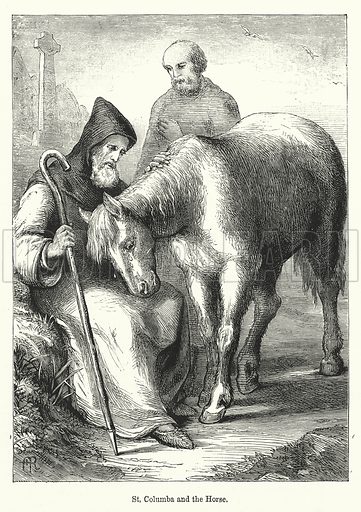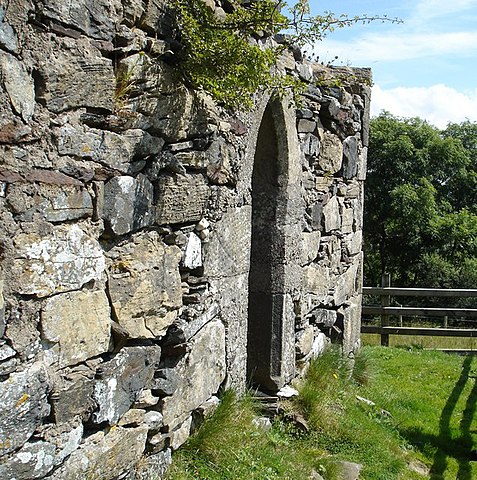St. Columba 521-597 AD | Patron Saint of Derry | Feast Day, June 9
One of Ireland’s most beloved Saints (he was buried at Down with Patrick and Brigid) this sixth-century poet-prince-warrior was called “Ireland’s first exile.” Columba was born in Donegal, of the royal clan O’Neill, and given the name “Columcille” meaning “Dove of the Church.” An excellent student, he became, in the natural course of things, a priest. He was famous in youth as a writer—both as a scribe, turning out hundreds of copies of sacred texts in his fine calligraphy, and as a creator of original verse. His work inspired the mighty Book of Kells.
Columba laboriously copied one psalter without the permission of its owner, St. Finnian, which led to history’s first copyright lawsuit and trial. The High King of Ireland, no friend of the O’Neills, decided the case against Columba. The King pronounced the text belonged to St. Finnian “to every cow its calf, so to every book its copy.” Columba refused to accept the judgment, the dispute escalated and all Hell (quite literally) broke loose—a war, “the Battle of the Book,” was fought in Sligo, near Ben Bulben Mountain. Because of Columba’s pride and bad temper, 3,000 warriors were slain.
Our Saint, naturally, repented, and his penance was this: he must leave Ireland forever (“Never again gaze on the face of a man or woman on Irish ground”), and bring to Christ as many souls as he had sent untimely to Heaven in battle. With a few choice companions, Columba sailed to pagan Scotland, establishing a monastery on the small, barren island of Iona, from which, on a (rare) clear day, you can see the hills of Ireland. From there he set out on his mission to the savage natives of North Britain, the heathen Picts (Scots). By his eloquent preaching and many miracles (including banishing the Loch Ness monster), he brought many more than 3,000 souls to salvation.
Despite his vow, Columba did come back once to Ireland. The High King had taken it into his head to outlaw the Guild of Poets, and the bards appealed to Our Saint. He came to Ireland, blindfolded, so he saw neither man nor woman but preached to the King about the power and nobility of poetry. He prevailed, the bards were restored and Columba returned to exile. When he was very old and tired, he went to visit his monks but became so weary that he stopped to take a rest by the side of the road. As he was sitting his white horse ran up to him and leaned his head against Columba’s chest drenching his shirt with his tears which poured into his lap.
For centuries, the O’Neills carried the book Columcille copied into victorious battle; it is now on display at the Royal Irish Academy. He wrote the Cathach, a psalter in Latin and the oldest surviving text in Ireland.
A standing stone in Donegal marks the place of his birth, and generations of his countrymen have visited it before going into their well-known worldwide exile.
Columa was Ireland’s first exile and Joyce was its most famous: “I will try to express myself in some mode of life or art as freely as I can and as wholly as I can, using for my defense the only arms I allow myself to use — silence, exile, and cunning.” ~ James Joyce, Portrait of the Artist as a Young Man



Leave a Reply